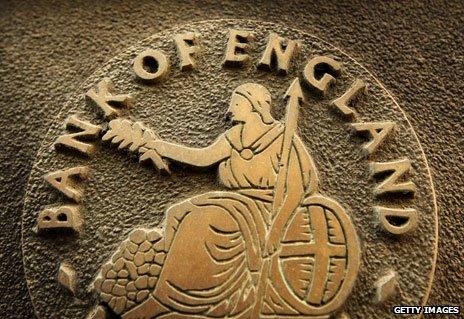UK banks 'still short of capital', says BoE
- Published
- comments

On Wednesday, Britain's banks will be put out of their misery, and will learn how much extra capital they have to raise as a protection against future losses - after a nerve-wracking five-month wait for the Bank of England's judgement.
So here is a bit of news that is only semi-enlightening.
The Bank's Financial Policy Committee (FPC) has concluded that they collectively need to raise more than the sums they have individually negotiated with the soon-to-be-closed Financial Services Authority (they have recently been agreeing measures with Andrew Bailey of the FSA to strengthen themselves - which is why, for example, Royal Bank of Scotland is shrinking its investment bank and floating off its US bank, Citizens).
How much more? I don't know. But I am told it will be a big enough sum for this to be a "real story" (in the not-very-helpful description of a source).
Why do they need more? Well, there may be a couple of reasons.
First, under the Basel system that allows big banks with "advance" status to set their own evaluations of the riskiness of different categories of loan - the so-called risk weights - there is not enough consistency in how much capital different banks hold to cover similar risks.
The Bank of England wants consistency (which many would say is not unreasonable). But levelling up the capital requirement, rather than levelling down, has revealed a shortfall in some banks.
So that is one reason why the banks in general are under-capitalised.
A second reason may be that banks are not taking a pessimistic enough view of the prospects for getting money back from customers who are in "forbearance", to use the jargon.
These are individuals and businesses on the brink of going bust, often referred to as zombies, who are just keeping their heads above water, because the banks have temporarily let them off some of their debt payments.
Anyway, for these reasons, I would expect the FPC to say tomorrow that the banks collectively remain short of capital to a fairly significant extent, even after their recent announcements of assorted plans to raise new capital through a great variety of initiatives.
Now the odd thing, which I didn't realise until recently, is quite how "Heath-Robinsonesque" the FPC's powers are.
Under the rules for the FPC, devised by the chancellor, it can and will make a declaration that the banks as a group have to raise a specific amount of new capital. But it can't and won't say that any particular bank in that group has to raise a particular amount.
What will happen after tomorrow's announcement is that the FSA, to be superseded next Monday by the Prudential Regulation Authority - see my piece from last night's 10 O'Clock News (below) for more on this - will then go off and have yet more talks with each of the banks, to determine their individual capital requirements.
The new system is the government's main response to the 2008 financial crash
In other words, there will continue to be uncertainty for a bit of time about the precise implications for individual banks.
Why does any of this matter?
In my 10 O'Clock News piece, you will have heard one explanation, given by the deputy governor, Paul Tucker (although to spare his blushes, I should say he gave no clue as to what the FPC would announce tomorrow).
He said, rather forthrightly, that banks will not provide the credit our weak economy badly needs until the banks' wounds are healed, until they have the capital they need to absorb all potential losses.
That is the positive economic case for forcing them to raise lots of additional capital - although I should point out that some bankers would take issue with this, and would argue that the threat of forcing them to strengthen their capital ratios has recently deterred them from lending (click here and here for more on this).
There are narrower implications for taxpayers and the chancellor.
The likelihood is that the FPC's capital ordinance will delay the day that RBS and Lloyds - the semi-nationalised banks - can resume paying dividends, which will in turn delay their respective privatisations (the payment of dividends reduces the rate at which capital resources are increased).
However my sense - and it is only that - is that the chancellor's worst nightmare, that taxpayers would have to subscribe for more shares in Lloyds and RBS, will somehow be avoided. As I've mentioned before, it would probably be career suicide for George Osborne if he were forced to further nationalise these banks.
At least some of the capital needed by the banks may come from further disposals. As I said a few weeks ago, RBS may have to sell Coutts.
And there will also be a proper test of whether investors want to buy new-fangled, hybrid capital called CoCos, or bonds that count as proper capital because they can absorb losses.
All of which may sound a bit Greek to you. Which reminds me to say "Cyprus" - which in turn is a reminder that the notion of the banks having to absorb big additional losses before too long is not a purely academic one.